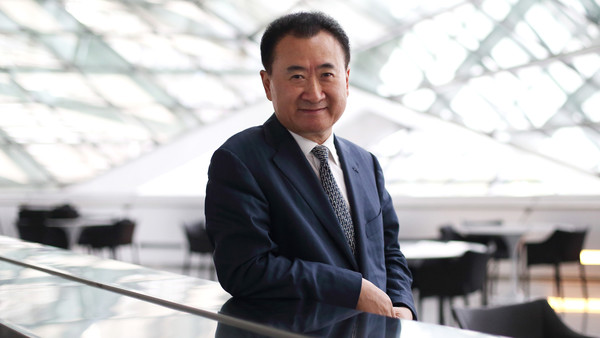When Spotlight , a film that celebrates hard-hitting journalism, won an Oscar for best picture this week, it also marked a triumph for China’s richest man, Wang Jianlin.
The film was produced by Open Road, a subsidiary of AMC Entertainment, the US cinema chain that Mr Wang’s company, Dalian Wanda, bought in 2012. The prize “marks the highest accolade ever received by a Chinese company in the global film arena”, a statement boasted.
But while Mr Wang, whose fortune is estimated at $28.7bn, basks in the reflected glory of a film about investigative journalism, his own engagement with the media is far more coy.
During a visit to the UK to launch the English-language version of his book, The Wanda Way, and announce plans for a €3bn leisure park in France and a similar UK project, the Chinese tycoon maintained a minimalist media profile.
At the British Museum, his book launch was undisturbed by the press. Selected journalists were invited to a book promotion event at the Saïd Business School, University of Oxford, but we were assigned seats at the back and told: “no questions”.
Students were free to ask but their efforts fell short of Spotlight’s standards. How did Mr Wang feel about opportunities in “a golden era” for UK-China relations, did he manage to get any “me time” and was he motivated by social duty or the pursuit of wealth?
A spokesman for the 61-year-old tycoon said although it was true that Mr Wang has little interaction with the media, this has nothing to do with sensitive revelations last year in the New York Times giving details of his business connections with the family of China’s president, Xi Jinping.
“He has cut down a lot but that is primarily due to his extremely busy schedule.” His PR company says: “He truly works over 13 hours a day, seven days a week and 30 days a month.”
These limited dealings with the press contrast with the self-made billionaire’s expansive personality: he has belted out a rock song on stage at a corporate function, mixed with Hollywood A-listers and risen from humble roots in the People’s Liberation Army to the top of his country’s rough-and-tumble real estate industry.
The Forbes billionaires list this week promoted Mr Wang to 18th in the world — the first mainland Chinese to make the top 20.
Dalian Wanda is now not only China’s biggest commercial property developer, it is also the world’s largest cinema chain and a leisure industries superpower. The acquisition of Hollywood film studio Legendary Entertainment for $3.5bn in January puts Mr Wang in charge of a glittering movie back catalogue that includes Jurassic World, Godzilla and The Hangover .
Like many of the Chinese corporations that invested a record $20bn in Europe last year, Dalian Wanda has built up debts so hefty that they cast doubt over the sustainability of his multibillion-dollar overseas acquisition spree. In fact, in the same week that his acquisition of Legendary Entertainment was approved, both Standard & Poor’s and Fitch, the rating agencies, downgraded the long-term credit ratings of Dalian Wanda Commercial Properties, his core Hong Kong-listed business. S&P now rates the company two notches above junk, Fitch one notch above.
The total debts of Dalian Wanda Commercial Properties amount to 6.5 times its annual earnings before interest, tax, depreciation and amortisation (ebitda), putting it in the highest category of leverage rated by Standard & Poor’s. Nevertheless, Wanda continues to expand at breakneck speed, intending to build 55 shopping malls this year and 61 in 2017 in China.
While such ambitions spook critics, a confident and assured Mr Wang told the Oxford students, hanging on his words, that he was taking a longer-term view. “It is hard to determine when [a project] is inexpensive and when it is expensive,” he said. “It may be the case if you look at your investment on a two- to three-year timespan, but if you take a long-term view, say 10 years, then it really does not matter.”
The €3bn leisure project on the outskirts of Paris announced last month envisages restaurants, parks, hotels, shops and entertainment outlets over 80 hectares by 2024. Mr Wang says, without giving details, a similar “large project” is in the works for the UK.
While Wanda’s ability to sustain such ambitions could be impaired if China’s real estate market slumps, the other issue that hangs over Mr Wang — his links to China’s political elite — is harder to assess.
These are turbulent times for China’s self-made billionaires, placing a premium on the political immunity that high-level official allies can bestow. The current status of Mr Wang’s connections to Mr Xi’s family is unclear, however.
Challenged by a professor during a similar visit to Harvard University last year, Mr Wang acknowledged that the president’s sister, Qi Qiaoqiao, and her husband, Deng Jiagui, had owned stakes in Dalian Wanda Commercial Properties before it went public. He added, though, that the couple had sold out before the shares were floated, giving up “huge gains” and thus proving “it is not corruption”.
In the UK last week, Mr Wang was in no mood to delve into the rarefied world where Chinese tycoons and Communist party officials interact. In the only one-on-one interview with the British national media, he delivered a warning to any journalist inspired by the fearless delving in Spotlight .
“For your good sake, I prefer not to answer this question, otherwise your article cannot be circulated in China,” the Sunday Times quoted Mr Wang as saying. “And it’s to protect you, to be safe in China.”
Financial Times
Please
contact us in case of Copyright Infringement of the photo sourced from the internet, we will remove it within 24 hours.

